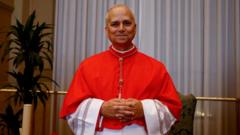Following his election, Cardinal Prevost inherits a complex political dynamic, facing ongoing scrutiny over U.S. immigration policies that align with previous criticisms from church leaders and Pope Francis himself, reflecting a broader clash between faith and politics.
New Pope Challenging American Political Landscape: Immigration Policies Under Scrutiny

New Pope Challenging American Political Landscape: Immigration Policies Under Scrutiny
As the first American pope, Cardinal Robert Francis Prevost continues to receive criticism from within the Catholic community towards the immigration policies of the previous administration and Vice President JD Vance.
Months before assuming the papacy, Cardinal Robert Francis Prevost, a notable figure in the hierarchy of the Roman Catholic Church, found himself amid the contentious immigration debate, particularly relating to the policies enforced during the Trump administration. His prior social media activity included reposting criticisms aimed at Vice President JD Vance, emphasizing a broader concern regarding the impact of the Trump-era immigration strategies on vulnerable communities.
The X account attributed to Cardinal Prevost highlighted several instances where he shared articles from credible Catholic sources that defied Vance's interpretations of Christian doctrine — interpretations the vice president used to bolster the administration's deportation policies. A February post referred to a National Catholic Reporter article that labeled Vance’s stance on immigration as "wrong," signaling a prevalent discontent among clerical voices with these political ideologies.
Further discourse from Cardinal Prevost’s social media presence included commentary from Catholic writer Rocco Palmo, questioning the moral awareness of Trump and El Salvador’s President Nayib Bukele regarding the toll of their immigration strategies. Back in 2015, the account shared a critical view from Cardinal Timothy M. Dolan concerning Trump’s rhetoric toward immigrants, described as “problematic.”
In a deeply striking moment, three years later, the account echoed Cardinal Blase J. Cupich’s perspective that condemning Trump's separation of migrant children from their families was devoid of any moral justification. Cardinal Prevost’s reposting of these messages illustrates a clear alignment with Pope Francis, consistently opposing the administration's harsh immigration policies.
In parallel, former President Trump’s response to Prevost’s elevation to the papacy appeared gracious, with him expressing eagerness to engage with the new pope, demonstrating a sense of diplomatic cordiality despite past tensions. Vice President Vance, who identifies as a Catholic, acknowledged Cardinal Prevost's election positively, publicly wishing him well in his endeavors to lead the Church.
This intersection of religious leadership and political policy presents a challenging landscape for Cardinal Prevost as he navigates the responsibilities of the papacy amid stark divisions in American opinions on immigration. As he moves forward, his stance will likely continue to resonate within the ongoing dialogue about faith and its role in public policy, especially concerning human rights and the plight of migrants.























